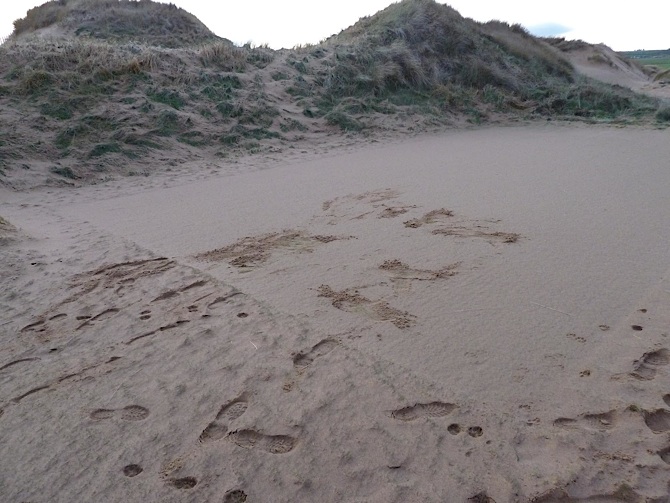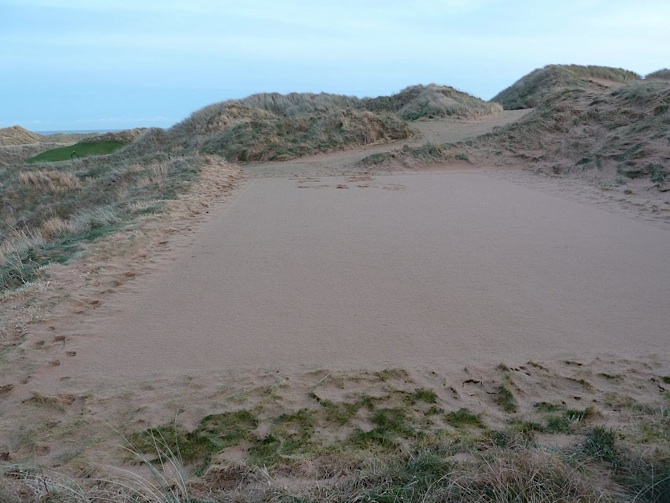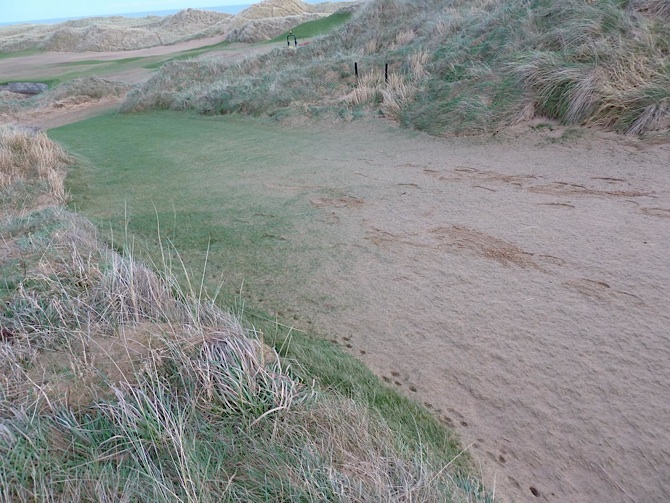I am the evidence (cont.)
 Further to my previous blog on the future prospects for Donald trump’s golf course (scroll down to see it), I am delighted to publish some photographs which illustrate Point 2 – that the Menie dunes will keep moving. These photographs were taken by Sue Edwards in December 2011 and show sand blown onto the tees of the 5th hole. These are of course quite minor blows but there have been 3 similar events this year alone.
Further to my previous blog on the future prospects for Donald trump’s golf course (scroll down to see it), I am delighted to publish some photographs which illustrate Point 2 – that the Menie dunes will keep moving. These photographs were taken by Sue Edwards in December 2011 and show sand blown onto the tees of the 5th hole. These are of course quite minor blows but there have been 3 similar events this year alone.
This follows erosion at Hole 3 which has involved engineering works to stabilise the green. Interestingly, the works were undertaken partially on land below the High Water mark – land which Trump does not own. I am making inquiries about what the Crown Estate Commissioners know abut this. Further details about this incident can be seen in paras 31-37 of this MEMAG meeting of 11 April 2011.


Being “delighted†to publish these photos which don’t look too good for TIGL (although maybe any links course looks like that before the greenkeepers have been out after a blow, but I’m not a golfer so I’ve no idea) doesn’t sound much like someone who does not wish for it to fail but claims to be disinterested as to whether it succeeds or not although accepts it would be far better if it did. Unless, of course, you just mean you’re delighted you’re being proved right in which case that just sounds insufferably smug.
You might also want to contact Marine Scotland Licensing Operations Team – they are the competent authority for development works below mean high water spring.
http://www.scotland.gov.uk/Topics/marine/Licensing/marine/
They have been contacted according to the minutes of the MEMAG meeting (which I shall link to in this post shortly.
Been reading your Trump Report. You don’t feel there’s any inconsistency in your criticising Aberdeen Journals for headlining the councillors who voted against Trump as “Traitors” considering that you entitled the chapter about the Crown Estate in your book “Simple Fraudulent Misrepresentsation”?
Nope. Aberdeen Journals ref is a comment on the standard of journalism in the NE. As far as I know no media outlet has ever called elected politicians traitors following an exercise of their statutory duties as decision-makers in the planning process (there is nothing to betray – merely a judgement to be made). The book chapter titles are all quotes from other sources – a literary device chose to make for engaging chapter titles – no more no less.
Oh what humbug Andy! The papers routinely accuse elected politicians of all sorts of infamy for doing nothing worse than making decisions in good faith but which the particular newspaper happens not to agree with. It’s a literary device to make for engaging headlines.
I don’t happen to approve of that sort of journalism either but I can’t see much difference between it and writers who headline quotes from un-named sources describing events which are not specified so the reader can’t make their own judgement whether the person quoted had a point or not.
Aberdeen Journals – Councillors they disapprove of – TRAITORS
Andy Wightman – Commissioners he disapproves of – FRAUDULENT MISREPRESENTATION
Naturally, I can’t expect you to name who said it but are you prepared to answer the following questions about your CEC fraud quote:-
1. What was the misrepresentation?
2. In what respect was it fraudulent?
3. Was it reported to the police?
4. If it was, what was the outcome of the police investigation?
5. If it was not reported to the police why not?
6. Why don’t you report it now (considering your zeal in reporting Barclays)?
I think you are making a false comparison with a newspaper headline and an obscure book chapter headline. Tens of thousands of people read the Evening Express and it frames political debate. Fewer than 10,000 people have probably read my book and can see that the chapter headlines are my attempt at a witty literal device designed to stimulate the reader. I concede that it is perhaps unfortunate that that particular quote was from a necessarily unattributed source. I am not prepared to answer the questions you pose because it would compromise the source.
Scale doesn’t affect the principle. A small estate nobody’s heard of with only one tenant farmer doesn’t deserve to escape the consequences just because it’s not a Buccleuch or an Atholl or a Seafield.